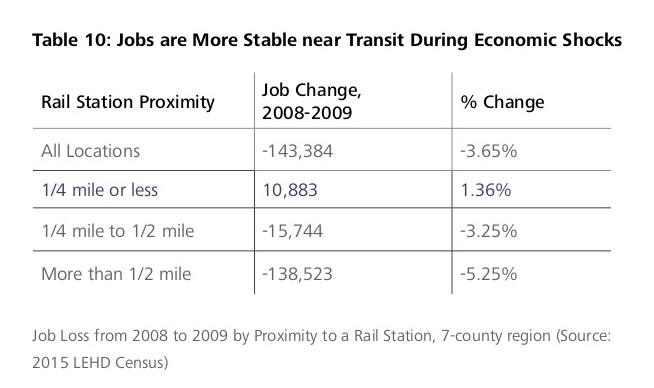It’s common sense that good public transportation makes cities more prosperous and more attractive to businesses and employees. But the new report from the Metropolitan Planning Council “Transit Means Business” quantifies that phenomenon, and includes case studies from 15 Illinois-based enterprises and institution.
“The purpose of this study is to show that transit is a really important stabilizing force for the Chicago region’s economy, and to highlight the need for the local business community to get behind it,” explained MPC transportation director Audrey Wennink. “Their voices are needed to help increase transportation funding and make sure transit is well represented in any future legislation.”
The report provides statistical evidence that an adequately funded, well functioning public transportation network leads to more job opportunities, better employee productivity, a robust real-estate market, and better health outcomes.
Here are some of the findings from the study:
- Between 2005 and 2015, 50 percent of new Chicagoland jobs were located within a half-mile of a CTA or Metra station. During that period, the region added 334,000 new jobs, a growth rate of almost 9 percent. Areas close to stations more than doubled the regional average, growing jobs by 19 percent.
- In 2017, 85 percent of all commercial construction in the seven-county region occurred within a half-mile or less of a CTA or Metra stop.
- During the financial crisis, areas within a quarter-mile of a CTA or Metra station were economically resilient, posting 1.36 percent job growth. Despite the region losing nearly 150,000 jobs during the peak of the financial crisis (2008-2009), areas within this quarter-mile grew by nearly 11,000 jobs.
- Transit commuting is growing rapidly for the region’s largest age cohorts: Between From 2011 to 2016, transit ridership to work for those ages 25 to 44 grew by 8 percent, while riders age 55 and over saw a spike of 23 percent.
- 13 percent of people in the region’s labor pool live in a household with no car which means for 588,875 people, transit is a main way they access jobs.
According to Wennink, many of the stats used for the study came from the CoStar real estate database. “You can search their data by proximity to a rail station,” she said. “But you can’t search by proximity to a bus line, so we used [the Chicago Metropolitan Agency for Planning’s] Transit Availability Index for that.”

For the 15 case studies, MPC looked at a wide range of businesses and organizations, ranging from McDonald’s, to the Illinois Medical District, to Testa Produce, to the University of Illinois, to (Streetsblog Chicago fave) Revolution Brewing.
Almost all of these companies said that transit is key for recruiting, especially when it comes to younger workers who are interesting in living in a city and not having to rely on driving to get around. As such, it’s an increasing trend for companies to relocate downtown (see McDonald’s move from Oakbrook, a relative transit desert, to the transit-rich West Loop) or work to make their locations more transit-accessible.
An example of the latter strategy is Bosch, a Mount Prospect-based global supplier of technology and services, which chips in on Pace bus service to make sure that employees can easily get from the nearest Metra station to its campus.
But the importance of transit to the financial health of the Chicago area and, by extension, all of Illinois, isn’t reflected in current state budget priorities. State funding for the CTA, Metra, and Pace was slashed during the 2017 Illinois budget deal. Moreover, the Regional Transit Authority has estimated that nearly one third of transit infrastructure in northeastern Illinois is not currently in a state of good repair. According to the RTA 2018-2023 Strategic Plan, the maintenance backlog for the three transit agencies is $19.4 billion.
Meanwhile, Illinois’ gas tax has been stuck at 19 cents a gallon since 1991 and, due to inflation, its buying power has dropped by 46 percent since then. Raising the gas tax will likely be necessary if we’re going to fix the Chicagoland’s transit system network, as well as other neglected state transportation infrastructure, but lawmakers are going to need strong political backup to do that. Support from the Illinois business community would make a huge difference.
“Basically, we know that transit is increasingly important to businesses,” Wennink said. “But if they’re betting on transit, we need to make sure we maintain that system, or there’s going to be a wakeup call.”
![]()
Did you appreciate this post? Consider making a donation through our PublicGood site.




